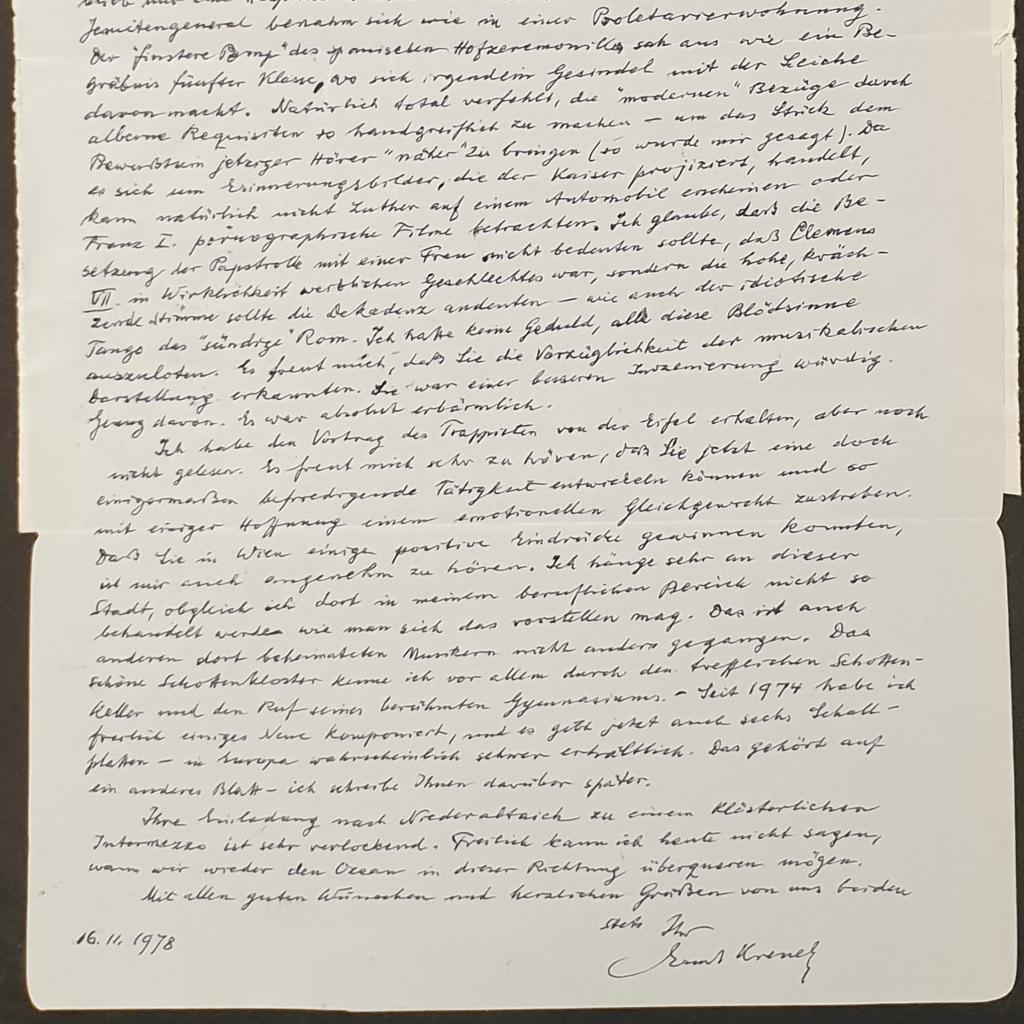„My encounters with Ernst Krenek“ by Frater Gregor Baumhof
After my high school graduation, I started studying music education at the Cologne Music College. On 14 January 1971, I registered for the first state examination in music. As suggested by Professor Joachim Blume I chose Ernst Krenek’s string quartets as the topic of my thesis. I had attended his courses on the subject “music analysis” with growing enthusiasm and with very good success for several years. Innocent as I was, I went to the music store Tonger and wanted to get the scores of the string quartets, but they had only two of them. Greatly disappointed I returned to Professor Blume and asked for his advice. He suggested: “Just write a letter to Ernst Krenek!” It was possible to find out the address and so I wrote a letter to Professor Ernst Krenek in Palm Springs, California and to my big surprise two weeks later, I proudly held a very friendly reply in my hands. From this bold initiative a correspondence evolved until 1977 with altogether 12 letters that are now kept at the Ernst-Krenek-Institute. In a roundabout way I was able to get the string quartets no. 6 and no. 7 from Universal Edition. No. 4 from the 1920’s was missing, not even Ernst Krenek really knew anymore where it was. In his biography I read that he had been a guest of the patron of the arts who established the Werner Reinhart Foundation in Winterthur. I got in touch with the foundation and asked, if they still had any manuscripts of Ernst Krenek. I received a very friendly and positive reply and also the notice, that I could have a look at these manuscripts. So, I drove to Winterthur, which is only one driving hour away from my hometown at Bodensee, was led to an assembly hall paneled in wood and was left alone with a bundle of manuscripts, among them the manuscript of the string quartet no. 4! I was allowed to make copies of the music material and returned back home more than happy. Ernst Krenek was very impressed with my discovery and asked me, if I wanted to complete his catalogue of works that was issued by Universal Edition. This turned out to be a considerable amount of work but it was crowned with success. Universal Edition thanked me with piano reductions of “Karl V.” and “Jonny spielt auf” [Jonny plays on].
Altogether, I met Ernst Krenek personally twice. Once he invited me to Stuttgart, where he conducted recordings of his works. In 1974 he invited me to the premiere of his last song cycle “Spätlese” [late vintage] at the Munich Opera Festival. Fischer-Dieskau inaugurated the work, Ernst Krenek accompanied him on the piano. This was a very impressive performance. During the break I talked to his wife Gladys Nordenstrom. On the following day I was invited to have breakfast with him at the Hotel Eden-Ernst. A third meeting in 1978 was unfortunately canceled. Ernst Krenek departed early because he protested against the staging of his opera “Karl V.” in Darmstadt. In the course of time, my interest in this exceptional character led to a large collection of almost all the books by him and about him.
In his letter from 18 March 1971, he wrote about my thesis: “Your work pleased me a lot. It is very rich in ideas and commendably precise. You have successfully managed to carve out the main stylistic and structural characteristics of these quartets in this limited space, which certainly was not very easy, especially with their – as you have very credibly interpreted – colorfulness of idioms and notations. Some of the details might have deserved to be described even more extensive – such as some of the “tricks” in the variations of quartet no. 5 – but I see that you had to organize the provided space carefully. … I hope and wish, that this wonderful work has served its purpose for you and that your professional projects flourish. With all good wishes and best regards always yours Ernst Krenek.” My thesis was graded with “very good” by the college. On 20 October 1971 I had passed the first partial examination of the state examination for the teaching profession at secondary schools with the grade “good”.
I remember Ernst Krenek as a very friendly person who turned towards me kindly and who had a clear stance towards the zeitgeist. He followed my path to the monastery later with great sympathy and respect. I am proud and thankful to have had the opportunity to be in personal contact with one of the great composers of the 20th century.
The original version of this article was published in the autobiography of Frater Gregor W. Baumhof „Wendelin Gregorius – ein Leben aus der Hand von Frau Musica. Eine Autobiografie, Bd. 1, 1948-1958“, 2021.
